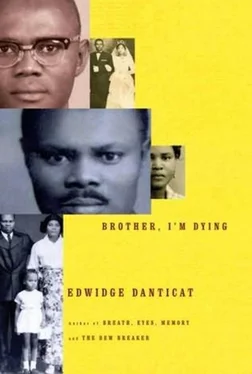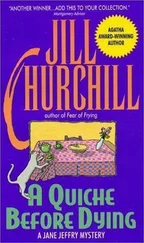Feeling an ideological void, he joined a Baptist congregation that one of his friends belonged to, using the time he would have spent at demonstrations and meetings to go to church. The Baptists offered the promise of a peaceful and stable life. They forbade so many things, including smoking and drinking, that there were few ways for a young man to get in trouble. The Baptists also forbade common-law marriage, so after more than a decade together, when their son Maxo was ten years old, he and Tante Denise finally married in a church ceremony, after which he became a deacon in the church. He then enrolled in a training course for future pastors and while taking the course befriended a group of American missionaries who regularly came to Haiti. He was eager to open his own church and a school. He was still wary of Americans from his memories of the U.S. occupation, but the missionaries were looking to fund a project in his area and he didn’t have enough to do it on his own, so he proposed his idea to them and they gave him some money to help with the building, blackboards, and benches and pledged a monthly contribution for a free lunch program for the students.
My uncle bought another plot of land in Bel Air and spent his evenings designing and then building his church. As the building came up from the ground, he would visit the site daily, both before and after his work at the textile shop. He’d stack bricks and mix cement, hammer wood with the workers. He wanted to feel like he was investing more than his heart and mind, that he was investing his hands and feet, his labor too. Because he believed that the church had redeemed him, saved him from a series of potentially hazardous choices, he named it L’Eglise Chrétienne de la Redemption, the Christian Church of Redemption. The shotgun-style, gable-roofed building, which doubled as a classroom and cafeteria during the week, he hoped, would redeem others as well.
As a child living in his house from the time I was four until I was twelve years old, I remember my uncle’s voice being crisp and distinct: deep and resolute, breathy and jingly when he was angry, steely and muted when he was sad. When he began preaching sermons, my father recalled, sermons which required that he project a wide range of emotions in one hour or less, my uncle had the same effect on the hundred or so people who attended his church as he’d had on those who crowded into his living room to listen to him talk about Fignolé. Many of them were indeed the same people and were surprised now in the church how much passion he could stir in them.
“His preaching style was very straightforward,” remembered my father. “He talked a lot about love. God’s love, the love we should have for one another. He knew all the verses for love. Sometimes I’d close my eyes and think, would I want to hear him if he wasn’t my brother and I’d have to say yes. Yes, he would have made a very good politician, but my brother was a better preacher.”
But one day in November 1977, while preaching a lengthy sermon to commemorate the church’s anniversary, my uncle’s voice began to quiver, then squeak. He shrieked like an adolescent boy at one moment, then could only moan the next. His throat and gums throbbed and hurt. The next day, he went to the local dentist, who decided he needed to remove all of my uncle’s teeth and replace them with dentures.
His voice did not improve even after all his teeth were gone, so he went to see several other doctors. The doctors couldn’t find anything wrong, so he went to herbalists, just as his parents and grandparents had before him. He was after all a child of the countryside-nou se moun mòn-and had been treated by roots and leaves most of his life. But the herbalists too were stumped. Meanwhile his voice grew fainter and his throat continued to ache.
One afternoon, in the spring of 1978, he was listening to the radio when he heard about a hospital in the south of Haiti that was associated with a radio station, Radio Lumière. Some American doctors were coming to the hospital and everyone who wanted to was welcome to come for a consultation. My uncle headed out to meet them.
After a day of slow, difficult travel on pitted, rocky roads, the camion he was on broke down in the early evening. Near the town of Gros Marin, he walked into a small two-room house by the side of a road and asked a peasant woman if he could spend the night on her beaten-earth floor. Her quick yes, so typical of the men and women of the Haitian countryside, reminded him of his own childhood. Lying in her front room on a palm frond mat and one of her best sheets, he thought back to a childhood of working in the fields and the palm-covered classrooms with neither walls nor doors where he learned his lessons sitting on the floor. He thought of a thin yet strapping father whose arms were so taut from a life of farming and fighting that he could render you unconscious with one slap while not even looking in your direction. He thought of the khakied American marines who he was told ambushed guerrilla resisters like his father in the middle of the night while wearing blackface. The Americans had reinstated forced labor to build bridges and roads and had snatched able-bodied men like his father and boys like himself from their homes. They were lucky to have been spared. So determined was he that he would not be taken that whenever Granpè Nozial was away from home, he’d sleep with a well-sharpened machete under his pillow.
The next morning my uncle was startled out of his sleep by the sound of a sisal broom sweeping the woman’s cactus-fenced yard. That gentle sound and the fragrant smell of brewed coffee helped remove his dread, filled him with hope. The woman handed him an enameled basin filled with cold water to wash his face and a handful of mint to brush the dentures she mistook for his own teeth. She then gave him a square of dimpled bread, which looked as though it was made from dough that had been poked with a dozen ice picks. The bread was carefully wrapped in a piece of muslin and lay on a plate that covered a metal cup filled with dark, sweet coffee. His hunger stirred, he gobbled the bread and washed it down with the coffee. He thanked the woman for her kindness and hospitality and with the air still cool from the night and the sun still very low in the sky, he continued on his way.
He had a long wait in the hospital yard. Hundreds of people were milling about, crouched in shaded corners of the concrete building, squatting under the giant almond trees, waiting. He was with men and women who were suffering from tuberculosis, malaria, typhoid fever and other not so easily recognizable afflictions. It had taken him a good part of the morning to walk from the woman’s house in Gros Marin to the hospital in Bonne Fin. He waited in the hot sun with the others until midafternoon, sweaty, hungry and thirsty now, hoping he wouldn’t be turned back.
At last, he was looked over by a nurse and placed among the least urgent cases. When it was his turn to see a doctor, one of the visiting physicians, a tall white man, pressed his tongue down with a thin wooden stick and told him he saw a mass sitting on top of his larynx. The mass might be a tumor, the doctor explained through a translator, and if not removed could eventually block his airways and suffocate him. He wanted to do a biopsy right away, the doctor said.
“Can you take it out?” my uncle asked.
“We will only do the biopsy now,” explained the translator. “We’re taking a piece, not the whole thing, but when the entire mass is removed, you might lose your voice.”
Stunned, my uncle asked again, just to be sure, “Will I lose my voice today?”
“We’ll only do the biopsy today,” the doctor repeated.
Before my uncle could ask what a biopsy was, the translator, a Haitian doctor, added, “You have to let them cut a piece of the mass in your throat to examine it for cancer. It might be your only chance.”
Читать дальше












